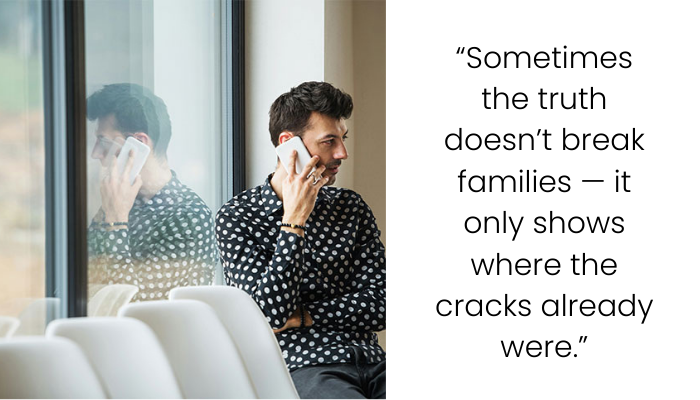I told my sister the truth about her cheating husband and now my family hates me
OP overheard their sister’s husband having what was clearly an intimate, flirty phone call with another woman. Not just casual talk, but words and tones meant only for a spouse. They sat with it for a few days, torn between staying silent and protecting their sister. Eventually, OP chose honesty and told their sister the truth.
The fallout was immediate. Sister confronted her husband, things blew up, and within weeks the marriage was over. OP felt sure they had done the right thing — no one deserves to live in the dark like that. But now? Their entire extended family has turned on them. Parents, cousins, even family friends accuse OP of meddling and “destroying the marriage.”
Sister, thankfully, doesn’t blame OP — she’s even grateful. But the rest of the family sees OP as the villain, especially within the context of South Asian culture, where preserving appearances and keeping marriages intact is often prioritized over personal happiness. Now OP is isolated, holidays are painful, and they’re left wondering if silence would have been better, even though they know deep down the cheating husband was the real problem.
The woman exposed her sister’s husband after catching him cheating

But instead of blaming the man, the rest of the family accused her of ruining the marriage
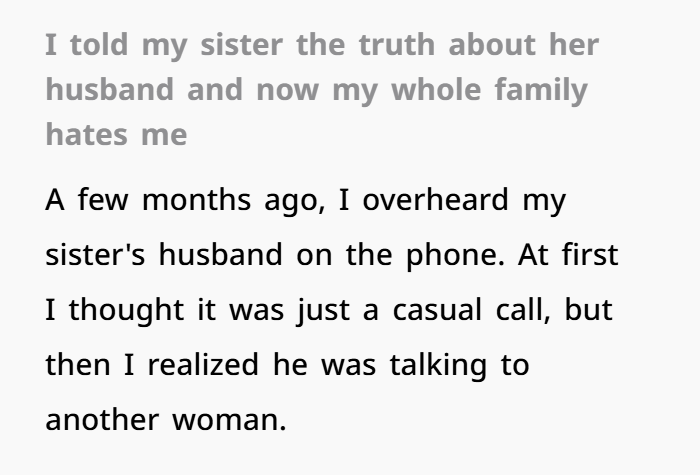
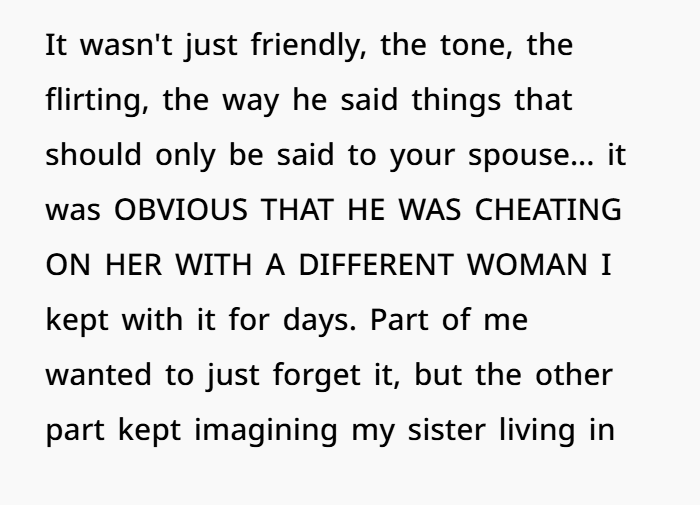
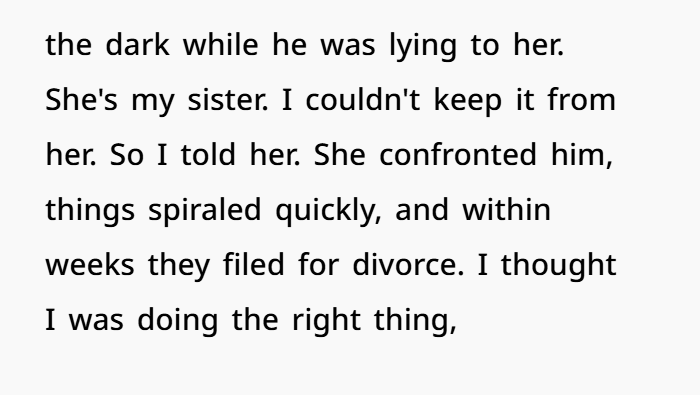
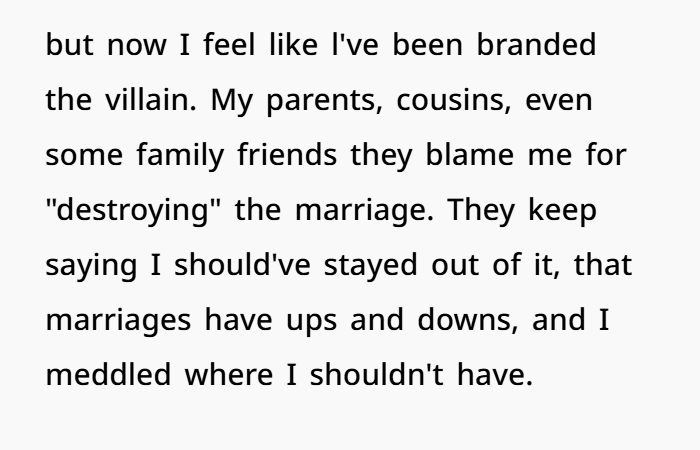
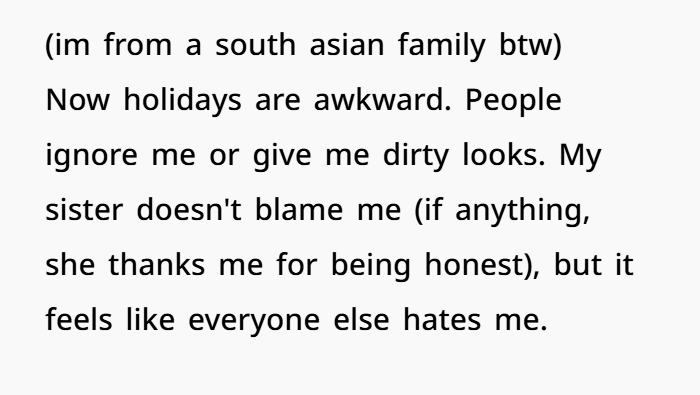
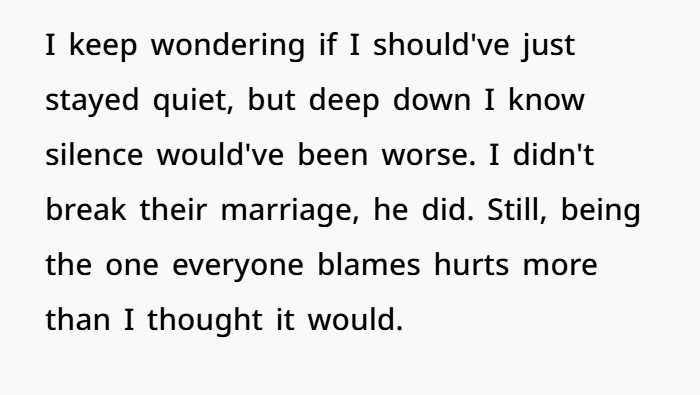
Alright, let’s talk about the messy cocktail you’re in: family loyalty, cultural expectations, and the price of telling the truth.
1. The “shoot the messenger” effect
There’s a well-known psychological phenomenon called “shooting the messenger.” People often redirect anger and blame onto the person who delivers bad news, rather than the one responsible. Why? Because it’s easier to be mad at the truth-teller than to confront the harder reality of betrayal.
Your family knows — deep down — that your sister’s husband was the one who destroyed the marriage. But blaming him means admitting he’s dishonorable, that they failed to protect your sister, that the family image is stained. Much easier to say you meddled than to admit he’s trash.
2. Cultural lens: South Asian family dynamics
This hits different in South Asian families. Marriage is often seen as a family institution, not just an individual choice. Divorce carries stigma, especially for women. Families will go to extreme lengths to “save face” and keep things under wraps, even if the marriage itself is broken.
By exposing the truth, you broke that unspoken rule of silence. To them, you didn’t just reveal an affair — you revealed a family shame. That’s why their anger feels outsized. It’s less about you personally and more about what you represent: disruption of tradition, unwillingness to play along with the “keep it quiet” culture.
3. Your responsibility to your sister
Here’s the heart of it: your loyalty isn’t abstract. It’s to your sister. And you honored that. If the roles were reversed, wouldn’t you want someone to tell you? Wouldn’t you be furious if everyone knew and let you live a lie?

Research on relationships and infidelity shows that betrayal trauma is worsened when victims discover others knew but stayed silent. It’s not just “my spouse lied to me,” it becomes “my family lied by omission too.” That compounds the pain. By telling her, you saved her from that double betrayal.
4. The cost of silence
Let’s imagine you’d stayed quiet. What happens?
- Maybe she finds out years later on her own. Then she asks: “Did you know?” Do you lie, or admit the truth? Either way, she’d feel doubly betrayed.
- Maybe she never finds out. She stays in a marriage with someone unfaithful, living a lie. And you live with the guilt of knowing.
Both scenarios end worse than the one you’re in now. Silence may have spared family drama short-term, but long-term it would have eaten at you — and probably destroyed your bond with your sister.
5. Why the family’s anger is misplaced
Let’s be clear: you didn’t cause the divorce. Cheating caused the divorce. The choice was his.
Family members often cling to the illusion of “keeping the marriage together.” But what they’re really keeping is control over the narrative. By speaking up, you ripped that away. You gave your sister agency, and in some families, especially traditional ones, a woman making her own choice — leaving a cheating man — is seen as rebellion.
Their anger says more about their priorities (image > honesty) than about your actions.
6. Examples from similar stories
- I’ve seen dozens of Reddit posts where someone told a sibling or friend about cheating. Almost always, the cheater deflects blame, and family members pile onto the truth-teller for “interfering.” Months later, once emotions cool, most admit the truth-teller wasn’t wrong.
- In one case, a woman told her sister about her husband’s affair. The family ostracized her for “breaking them up.” Two years later, after the husband cheated again, the family finally admitted she was right. But she had to live with the cold shoulder until then.
That’s often the arc: immediate blame, long-term vindication.
7. Why it hurts so much
Even though you know logically you did the right thing, rejection by family cuts deep. Humans are wired for tribal belonging. When your whole clan gives you side-eyes at holidays, your brain interprets it as danger. That’s why the pain feels heavier than expected.

But here’s the reframe: you’re not hated because you’re wrong. You’re hated because you disrupted the lie they wanted to keep. That means your integrity is intact, even if your family relationships aren’t.
8. Moving forward
So what do you do now?
- Hold onto your sister’s gratitude. She’s the one who matters most here, and she’s with you. That’s the validation you need.
- Don’t grovel. If you apologize, make it clear: “I’m sorry you’re upset, but I’m not sorry I told the truth.” That distinction matters.
- Find allies. Sometimes in families, one or two relatives secretly agree with you but won’t say it publicly yet. Keep those connections alive.
- Give it time. Anger fades. Once the dust settles, many will redirect blame where it belongs — the cheating husband.
Readers reassured the author that she did the right thing
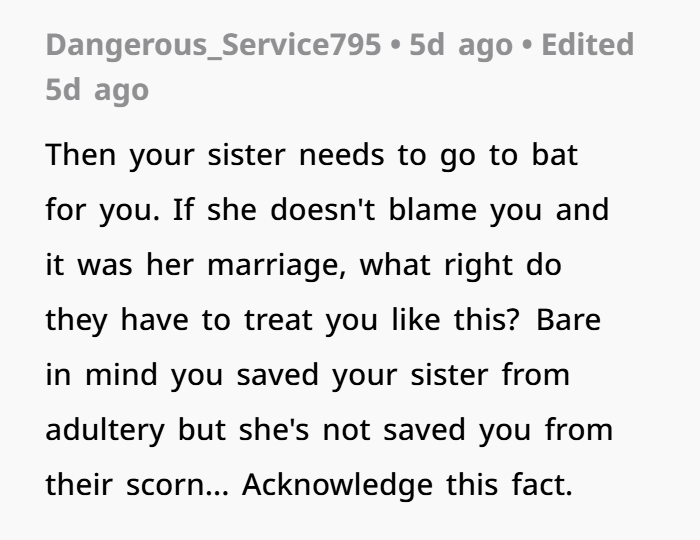
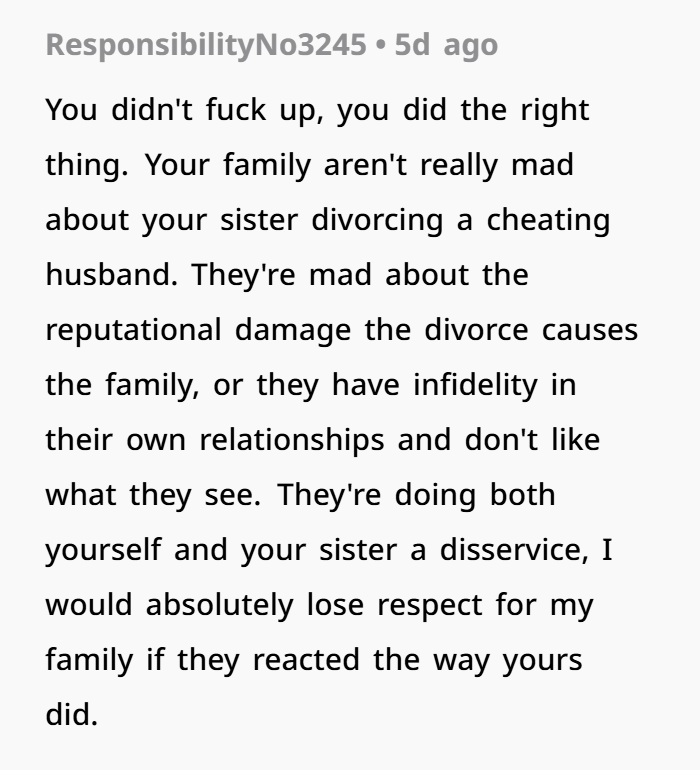


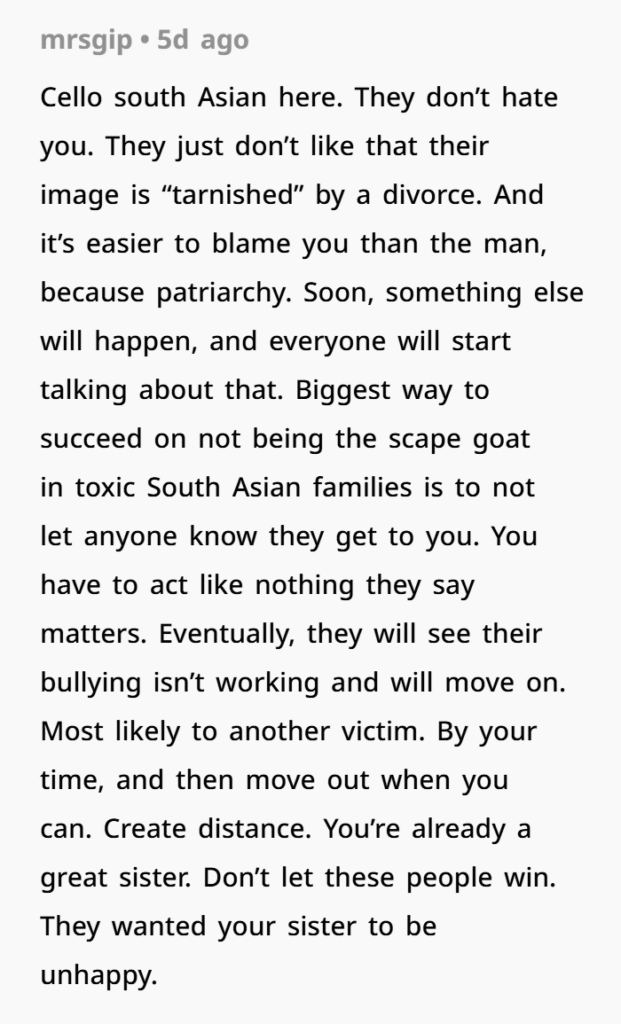
NTA. You didn’t destroy the marriage — you exposed the destruction that was already there. Your sister’s husband wrecked it, not you. Your family blaming you is unfair, but it’s also a reflection of cultural shame and their need for someone to scapegoat.
When the history of this is written, your sister will remember you as the one person who stood by her when it mattered. That’s worth more than the approval of relatives who would rather protect appearances than protect her.

